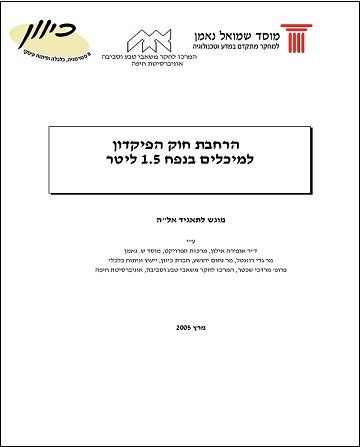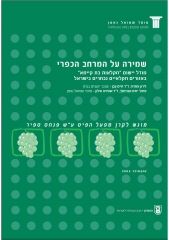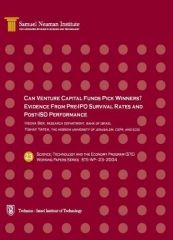Firm Growth Profiles (FGPs): Towards an Action-Based View of Firm Development STE-WP-24
The paper presents the concept of the Firm Growth Profile (FGP) which contributes to the creation of a dynamic Resource-Based View theory by explaining how capabilities are developed in path-dependent processes. An FGP represents the pattern of critical actions taken by a firm in different value activities (e.g. R&D, marketing, production and finance) during subsequent […]
Implications of expanding the Deposit Law to 1.5 liter bottles

This joint research project, carried out by the Samuel Neaman Institute and ELA- the recycling cooperative, examined the following parameters: Economic costs of the Packaging Law in Israel Implications of expanding the Deposit Law to 1.5 liter bottles Results of the studies indicate that the bottle deposit law in its present form, taking into account […]
Conservation of the rural landscape: Implementation model of sustainable agriculture in selected agricultural areas in Israel

Agriculture produces rural landscape, environmental services, cultural and social values in addition to the marketable food and fiber products. The aim of this research is to suggest policy mechanisms to advance the sustainability of agriculture in Israel. This stage of the research focused on the implementation of such mechanisms in specific regions, following a more […]
Policy Towards Reducing Transportation-Related Air-Pollution in Dan Region
This report summarizes activities carried out today in the municipal and governmental systems all over the world, that have an effect on transportation and air quality related . This literature review identifies technological developments and other transportation concepts and policy measures that are ready for use and could be integrated and affect air quality in […]
Air conditioner survey in Israel- conservation potential and policy measures
This survey, conducted for the ministry of environment, reveals the significant contribution of energy demand, especially in peak hours, for the air conditioners sectors. Since high energy demand during noon hours in summer- time influences the ability of the Electric company to supply the demand, this report suggests several ways to calculate the incentives needed […]
Can Venture Capital Funds Pick Winners? Evidence from Pre-IPO Survival Rates and Post-IPO Performance STE-WP-23

This paper evaluates the ability of venture capital funds to identify and bring to market successful high-tech Israeli companies during the period 1991 to 2000. Using a newly constructed and highly detailed database we find that: (1) The probability of survival until the IPO stage is higher for venture-backed companies. (2) According to several different […]
Immigrants in the Hi-Tech Sector: Comparison to Natives and the Effect of Training STE-WP-22-2004

This paper provides a descriptive analysis of the integration of the immigrants from the CIS in the Israeli labor market and, specifically, in the hi-tech sector. The analysis is based on the national cross sectional Labor Force Survey and on a unique panel data that follows Russian engineers for up to twelve years in Israel. […]
Instruments for Open Space Preservation: What Can Israel learn from other countries?
Conservation of open space is a difficult goal to achieve in a densely inhabited country such as Israel. Despite the efforts of Israel’s statutory planning bodies and the availability “on paper” of a plethora of planning and legal tools, development pressures often win out. More innovative tools, or a repackaging of tools, are therefore necessary. […]
The global Environmental Market – An Economic Opportunity for Israel Primary model to assess the costs and benefits of governmental investment in the field of environmental technologies
Israel can and should play a viable role in the global market for environmental technologies. The role of the government should include not only direct financing of this sector, but also help in marketing, “door opening” and governmental insurance. The basic assumption of the model is that by using the governmental aid, the odds of […]
National Environmental Priorities of Israel, Position Paper IV, Vol. 1: Environmental education

Effective environmental education is required at all levels, from kindergartens through universities. Environmental education will assist in developing environmental awareness in our youth, while environmental education in the universities will enrich our professionals, who will, therefore, consider environmental problems to be within their professional activities. The Ministry of the Education, as well as the Ministry […]
